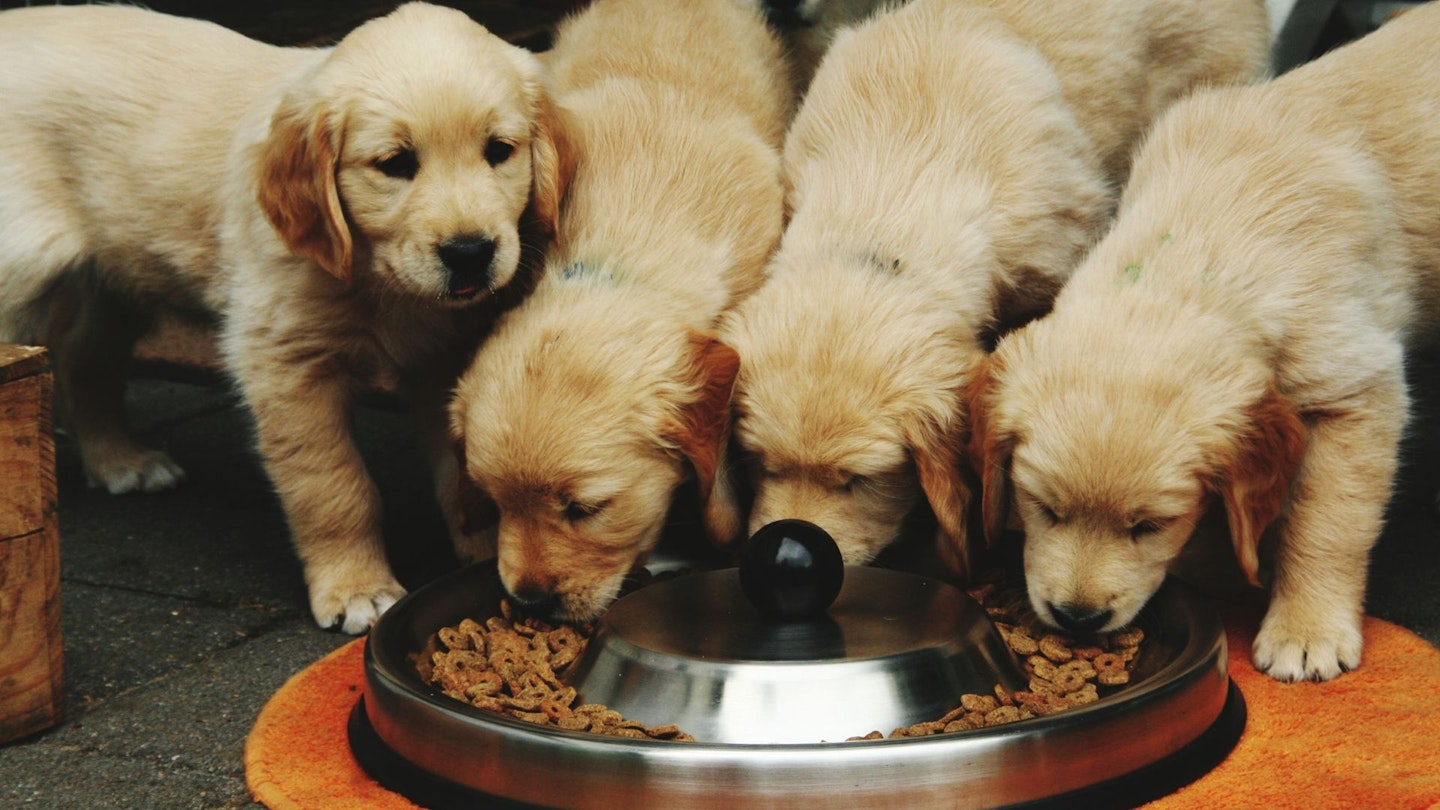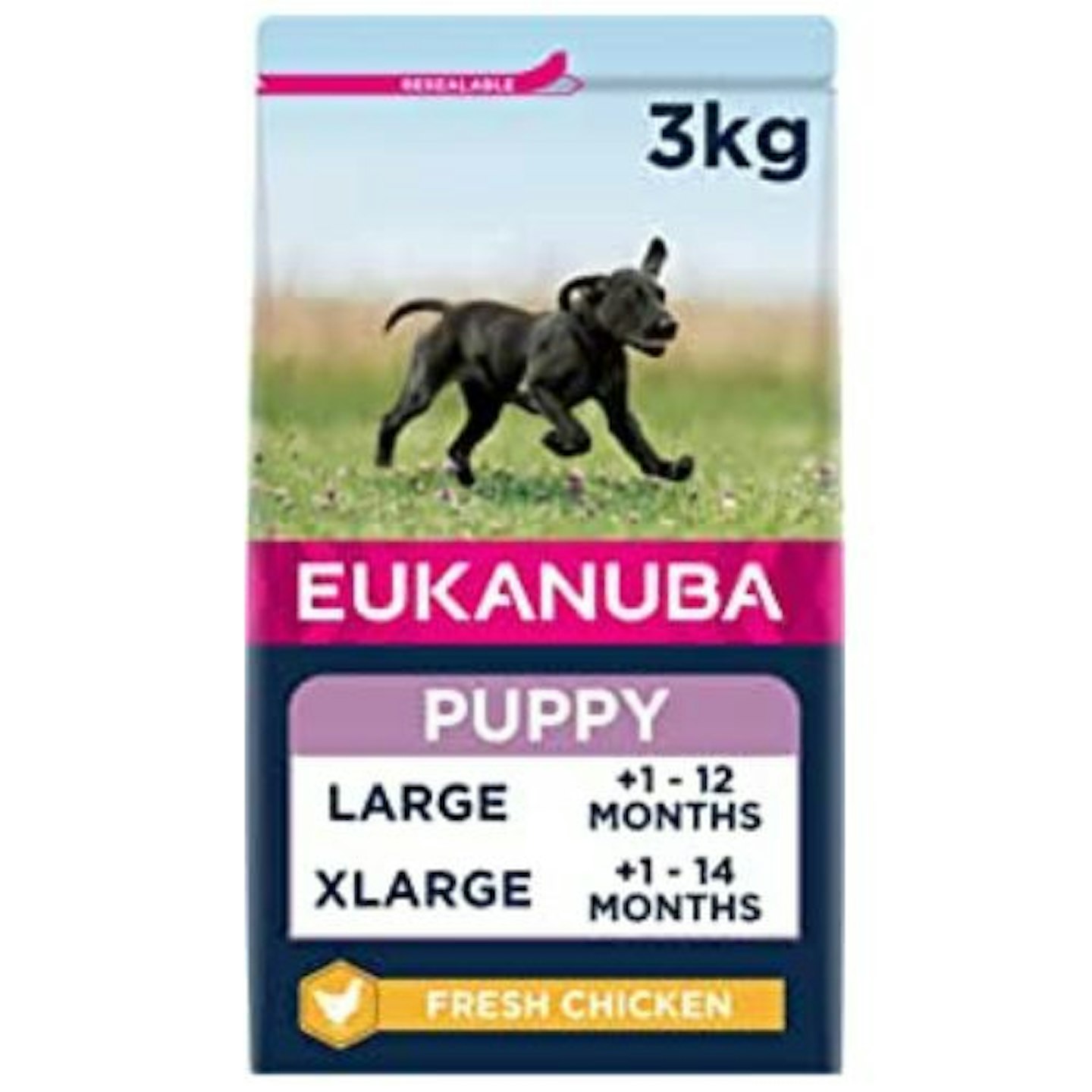The best large breed puppy food supports bigger dogs' growth, whilst having the right nutrients to prevent skeletal problems in later life. In the UK, a large breed is classed as a dog that weighs over 25kg when fully grown. Rottweiler, Labrador and Alaskan Malamute are very different dog breeds, but their weight range defines them as large breed dogs. In addition, Newfoundland, St Bernard and Great Dane are classed as giant breed dogs because they weigh over 45kg.
Large-breed puppies require special foods to avoid health problems that are particular to their size and breed. As an adult dog, conditions such as orthopaedic disease, bloat and obesity can become life-threatening. That's why it's crucial dogs get the right nutrition as a puppy. In addition, instilling the right eating habits for large-breed dogs should start as soon as your pup is weaned. This can be dry puppy food or wet puppy food, but the key features are that it's the right size kibble and it doesn't contain too much calcium. Too much calcium in the food can cause permanent bone damage - such as hip dysplasia - in large-breed dogs. GA Pet Food Partners advise that calcium intake in dog food is "a strict maximum of 1.6g/100g DM" for large breed puppies.
Best large breed puppy food at a glance:
• Best dry puppy food for large breeds: Hill's Science Plan Large Puppy Dry Dog Food - view on Pets at Home
• Best wet puppy food for large breeds: Wainwright's Wet Puppy Food Variety Pack - view on Pets at Home
• Best tailored dog food subscription: Butternut Box Subscription - view on Butternut Box
• Best puppy food for robust development: PRO PLAN Large Puppy Dry Dog Food Chicken - view on Pets at Home
Adult dog food contains too much calcium for large-breed puppies who are still developing their bone mass. Don't be tempted to transition your pup onto adult food too soon. Large breed puppies take longer to reach their full adult body weight - so be guided by their breed type. As a rough guide, a large breed that's between 25-45kg should transition to adult food at 12-18 months. Similarly, a giant breed (over 45kg+) should transition to adult food between 18-24 months.
It's better to control the portion size of food because large-breed puppies can be greedy. Overfeeding can cause bloating and lead to bone abnormalities in later life. So, set mealtimes for your puppy rather than letting them graze.
Best large breed puppy food
Best dry puppy food for large breeds
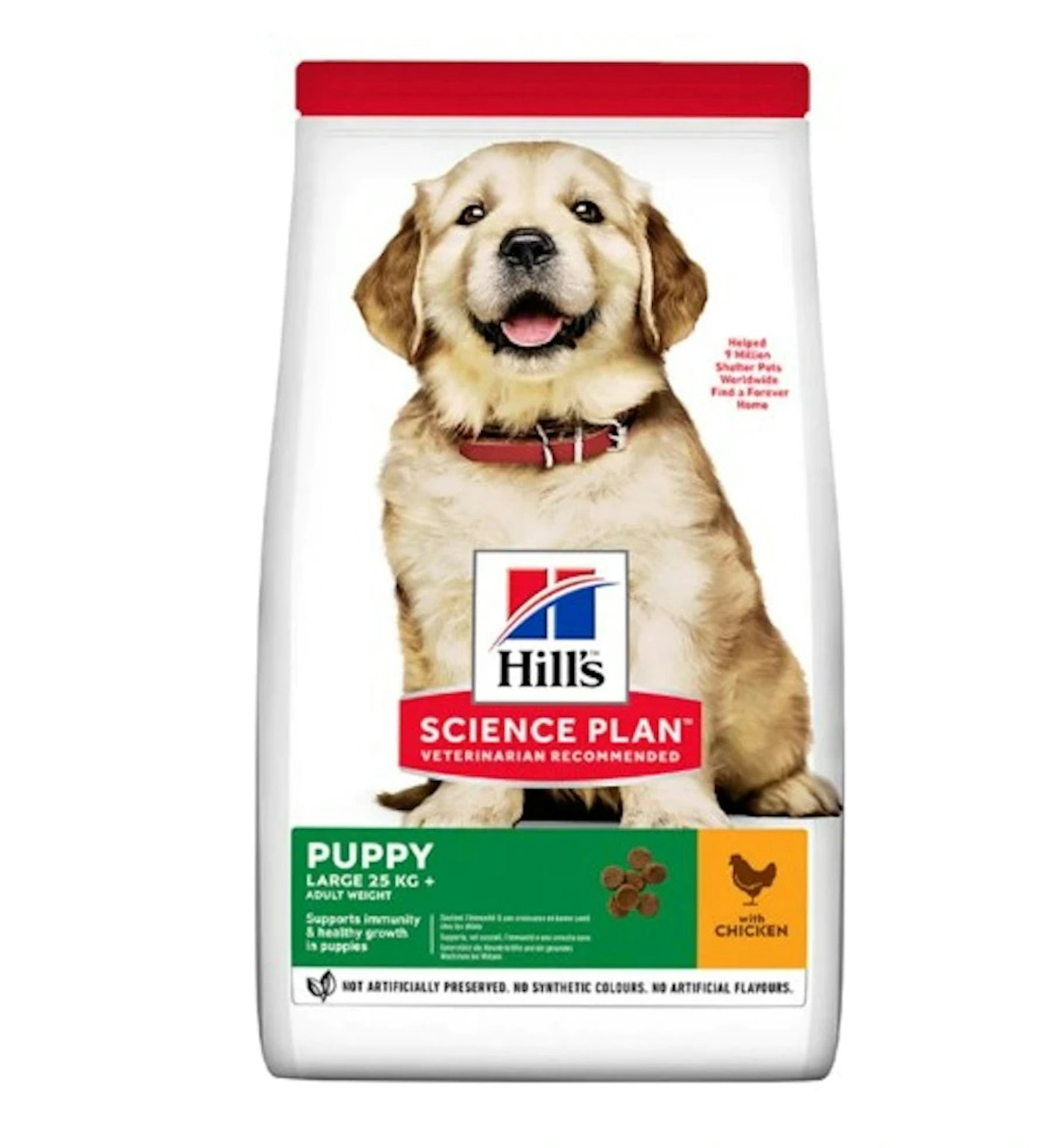
www.petsathome.com
Give your playful pooch the best and see their tail start wagging. For large breed dogs under 18 months, healthy growth and development are important to make sure they get the best start in life. This delicious Hill's Science Plan Large Puppy Dry Dog Food provides high-quality protein for building lean muscles, DHA from fish oil for healthy brain and eye development, and balanced minerals for strong bones and teeth. Just as their powerful personality is developing, your dog's body needs the right building blocks to grow too and Hill's Science gets our paw of approval.
Customer review: "Puppy loves this food - Helped her gain weight at a healthy pace and keeps her feeling fuller for longer - coat, skin, eyes and teeth all looking healthy after being on this food - Brilliant value for money considering Pets at Home charge £45 (ish) for this size. - Our older dog has now gone onto the adult (small dog version food) and he is loving it too."
Pros
- High quality protein for building lean muscles
- Balanced minerals for strong teeth and bones
- Suitable for large breed puppies up to 18 months
Cons
- When bulk buying a large bag, you need to make sure you've got plenty of room to store it and the correct storage method to keep it fresh
| Quantity: | 12kg |
| Flavour: | Chicken |
| Ingredients: | Maize, chicken and turkey meal, brewers' rice, digest, animal fat, dried whole egg, cellulose, dried beet pulp, minerals, flaxseed, fish oil, vegetable oil |
Best wet puppy food for large breeds
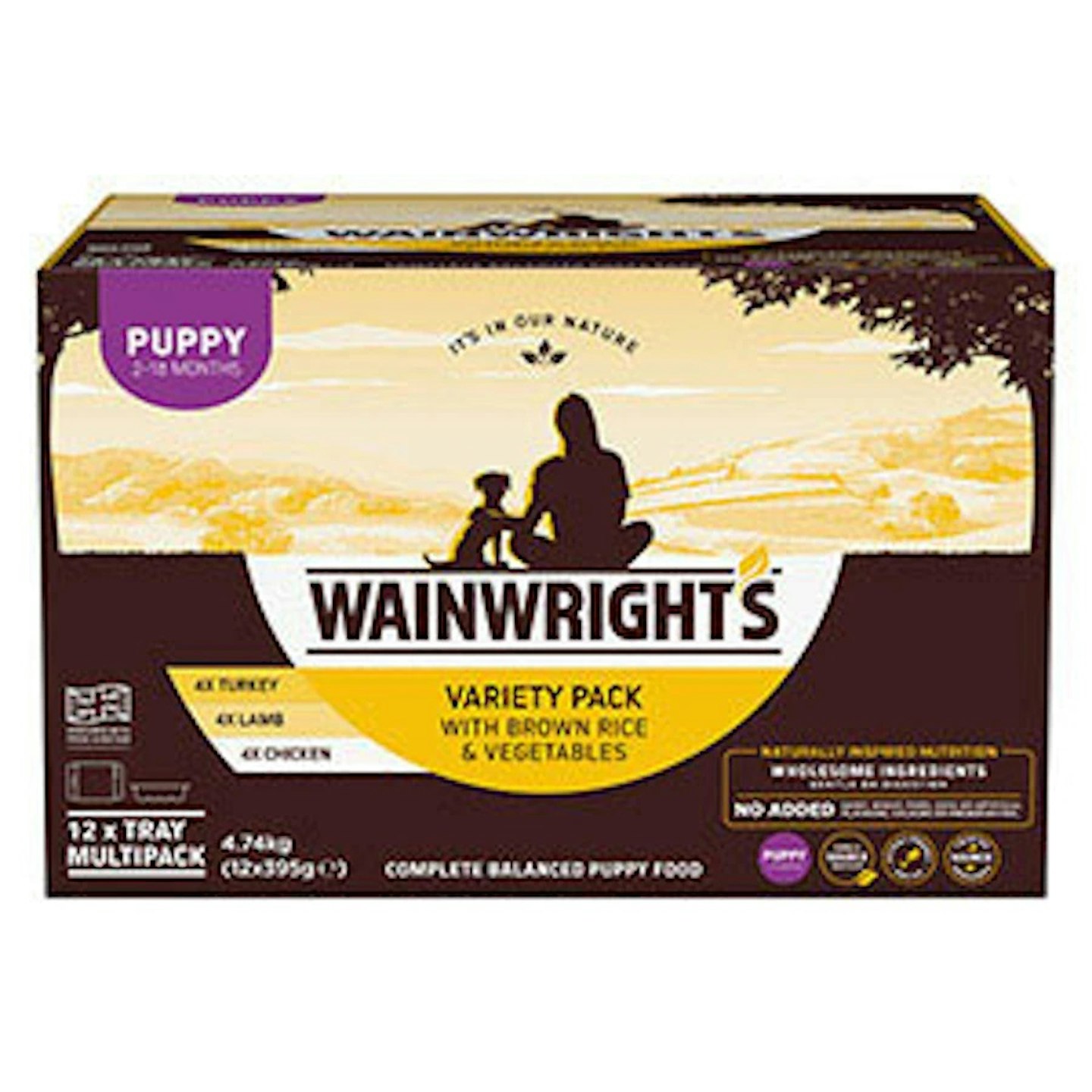
www.petsathome.com
For faithful friends that will grow into loyal and loving dogs, this wet puppy food contains 70 per cent protein to help them grow big and strong. Larger breeds grow a lot faster than smaller ones, so it is vital that you feed your puppy everything they need to help them grow strong and healthy. This Wainwright's Wet Puppy Food Variety Pack contains wholesome ingredients that are easy to digest - perfect for pups who eat a lot and are always on the move.
Customer review: "My 12-week lab pup Freddy loves this food. Cleaned his plate in seconds. Different flavours for him to try. The only problem is it's a bit smelly but he doesn't seem to mind."
Pros
- Large portions
- Suitable for up to 18 months
- Gentle on digestion
Cons
- One reviewer felt the consistency was too mushy
| Quantity: | 12 x 395g |
| Flavour: | Turkey, Lamb and Chicken |
| Ingredients: | Turkey (72 per cent), Turkey Liver, Brown Rice, Dried Peas, Dried Carrots, Sweet Potato, Minerals, Dried Alfalfa, Pear, Dried Seaweed, Dried Herbs (Parsley, Rosemary, Fennel, Marigold Flowers), Flaxseed Oil, Chicory Root Powder, Yucca Extract |
| Lamb (72 per cent), Lamb Liver, Brown Rice, Dried Peas, Dried Carrots, Sweet Potato, Minerals, Dried Alfalfa, Pear, Dried Seaweed, Dried Herbs (Parsley, Rosemary, Fennel, Marigold Flowers), Flaxseed Oil, Chicory Root Powder, Yucca Extract | |
| Chicken (72 per cent), Chicken Liver, Brown Rice, Dried Peas, Dried Carrots, Sweet Potato, Minerals, Dried Alfalfa, Pear, Dried Seaweed, Dried Herbs (Parsley, Rosemary, Fennel, Marigold Flowers), Flaxseed Oil, Chicory Root Powder, Yucca Extract |
Best tailored dog food subscription
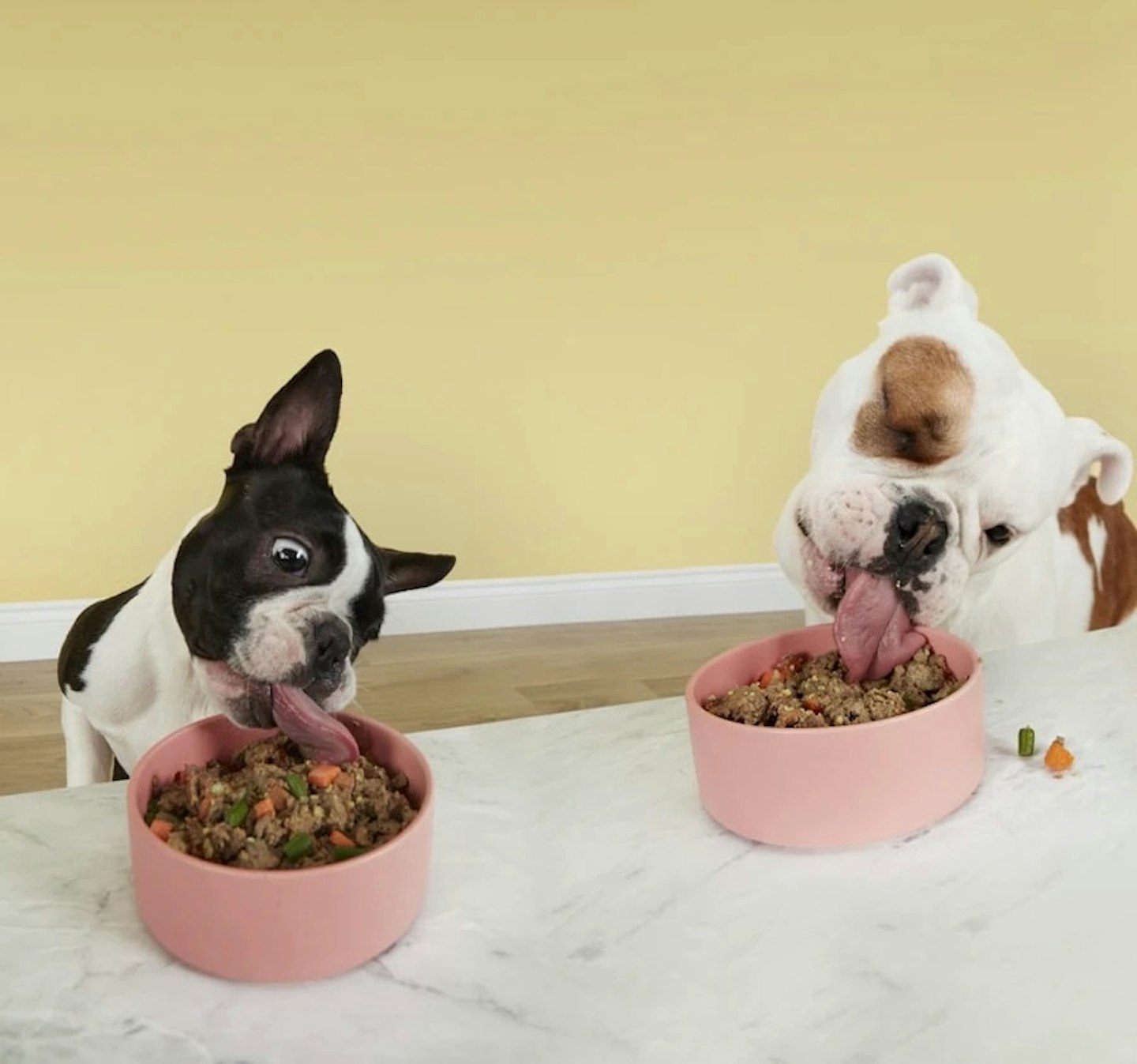
butternutbox.com
Butternut Box is the UK's home for fresh dog food delivery. It is easy to think that Butternut Box provides a raw diet for your dog, but the recipes are actually fresh meals made from human-quality meat and vegetables, gently cooked to create appealing meals. The recipes are created with the right balance of vitamins and minerals for your dog. As part of the service, you have to give them information about your dog's breed, calorie needs, age and lifestyle. They really get to know your dog and provide a variety of different meats, fish and vegetables than other brands out there. A great place to turn to if your dog is constantly turning their nose up at dry food.
Customer review: "Our fussy pooch is really impressed with his new diet. From initially meeting the Butternut Box team at Crufts to the arrival of our GSDs first couple of boxes of food, we've been really happy with the service and product. The variety is great and we have one happy dog."
Pros
- No nasties whatsoever
- Smells amazing
- Tailored to your dog's size, age and breed
Cons
- Need freezer space to store
| Food format: | Fresh minced meat and vegetables, frozen |
| Flavours: | Beef, Chicken, Turkey, Lamb, Pork, Duck and Chicken, Veggie, Plant, Salmon |
Best puppy food for robust development
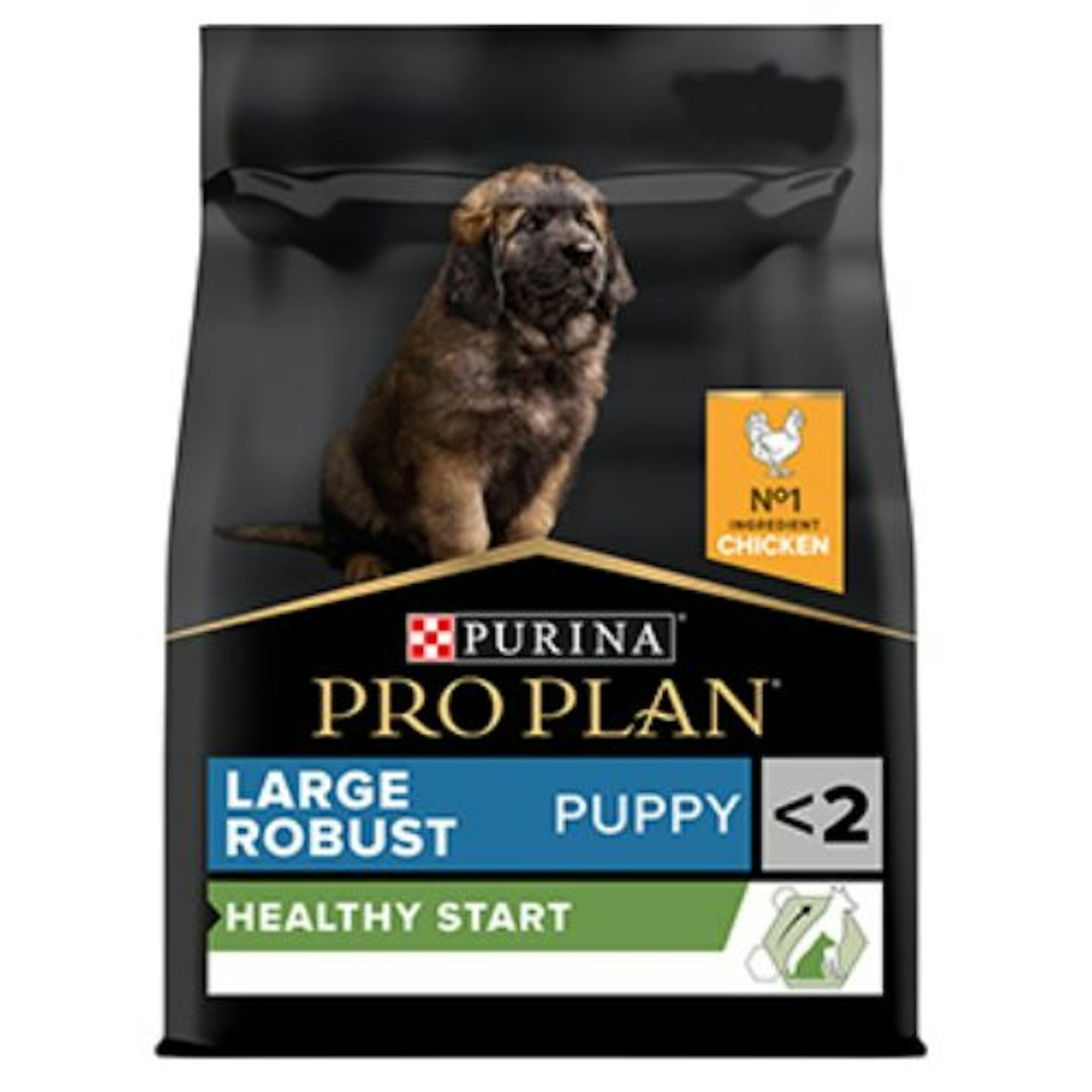
www.petsathome.com
PRO PLAN Large Robust Puppy Dry Dog Food is rich in chicken for thriving large breed puppies to grow into big and beautiful dogs. This dry food contains colostrum (found in the mother's first milk) which helps support puppies' natural defenses. PRO PLAN OPTINutrition is Purina's most advanced and efficient combination of nutrients, and as industry experts, this is a brand we highly recommend. Vets and nutritionists have developed Purina PRO PLAN Puppy with OPTISTART. The five-star reviews are a sure sign that puppies and owners alike are fans of PRO PLAN too.
Customer review: "Our seven month old Bulgarian rescue pup has tried a number of different brands when it comes to dog food, but I have to say since introducing the Purina Pro Plan to him, we've seen a more content dog. He gets incredibly excited whenever he sees the pack and cannot wait to get stuck into the biscuits. I love the fact that despite being a decent size, they feel incredibly light and seem to be very easy for our Theo to crunch away on. Even our old Staffie is intrigued by them, although Theo has absolutely no intention of sharing."
Pros
- Available on Easy Repeat subscription
- Complete food that's nutritionally balanced
Cons
- Contains wheat fibre so take care if your puppy is sensitive to wheat gluten
| Quantity: | 3kg |
| Food type: | Dry kibble |
| Ingredients: | Chicken (17 per cent), wheat, dehydrated poultry protein, maize, rice, soya meal, animal fat, wheat fibre, gluten, digest, dried beet pulp, minerals, fish oil, dried colostrum |
Best kibble for large breed puppies
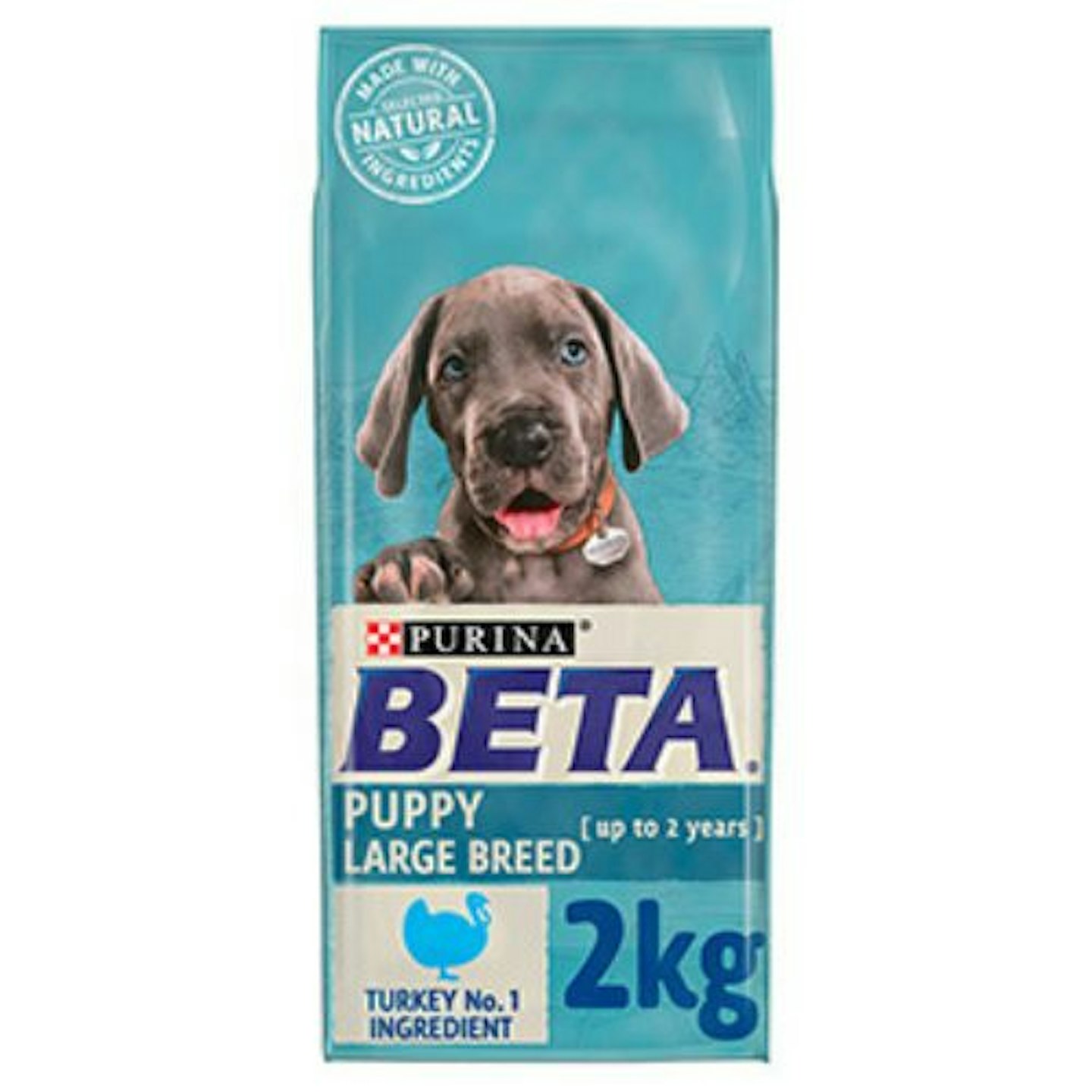
www.petsathome.com
Beta knows that diet is fundamental to overall good health. BETA Puppy Large Breed Dry Food Turkey contains natural ingredients and a prebiotic to support digestive health. In addition, the kibble is dual size for slower chewing and stops greedy pups from gobbling their food too quickly. Your resident canine with thrive on this complete food that's full of protein, essential fatty acids and amino acids, and vitamins and minerals.
Customer review: "In mine and my pup's opinion, the best puppy food going. My pup loves this food, is kind to her tummy and is a great balanced diet and very affordable."
Pros
- Owners and puppies love it
- Dual kibble size to slow down scoffers
Cons
- Contains wheat, which might not be suitable for some dogs with sensitive stomachs
| Quantity: | 3kg (or 14kg) |
| Food type: | Dry kibble |
| Ingredients: | Turkey meal, Wheat, Corn, Soya Meal, Poultry fat, Wheat middling, Dried beet pulp, Corn gluten, Digest, Dried chicory root, Fish oil, Minerals, Dried Carrot, Dried Spinach, Dried Parsley |
Best hypoallergenic large breed puppy food
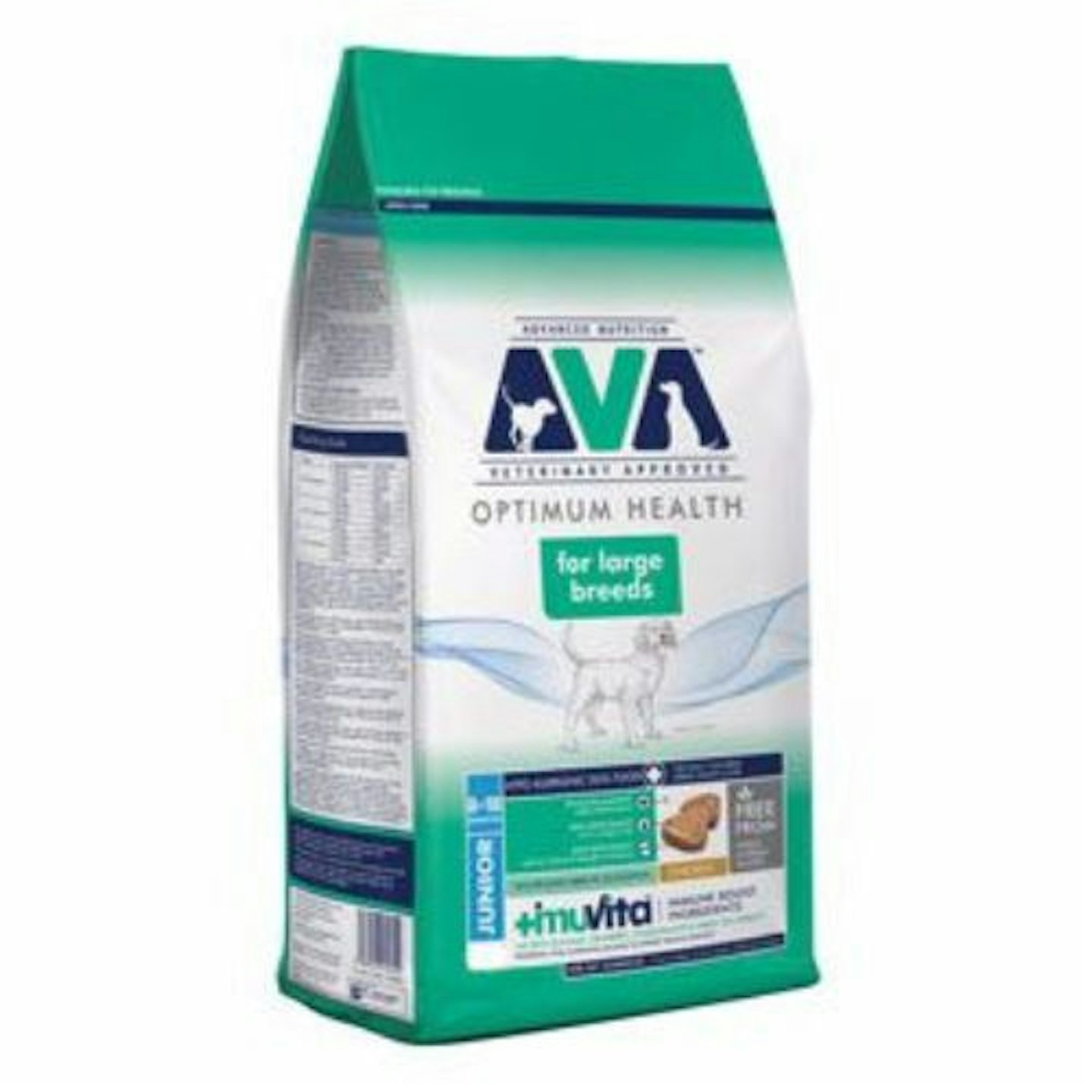
www.petsathome.com
For bounding puppies that are bursting with vitality, choose AVA Veterinary Approved Optimum Health Large Breed Dry Puppy Food. This complete food is packed with vitamins, minerals, fatty acids that's tailored to the nutritional requirements of large breed dogs. Also, this kibble is hypoallergenic, so it's a good option if your puppy is showing the symptoms of a sensitive stomach.
Customer review: "The biscuit size is bigger than expected but for large breed dogs I am sure it correct. My Akita X loves the biscuits and eats all."
Pros
- Good value
- Hypoallergenic
Cons
- Unclear feeding guide
| Quantity: | 2kg |
| Food format: | Dry kibble |
| Ingredients: | Chicken Meal, Fresh Chicken, Chicken Fat, Chicken Gravy, Brown Rice, Maize, Beet Pulp, Whole Dried Egg, Salmon Oil, Brewers Yeast, Minerals, Pre-biotic Fructooligosaccharide, Beta-glucans, Pre-biotic Mannanoligosaccharides, Glucosamine, Chondroitin, Yucca Extract, Cranberry Extract, Green Tea Extract, Pomegranate Extract, Rosemary Extract |
Best eco-friendly dry dog food for large breeds
Eukanuba Complete Dry Dog Food for large breed puppies has a hexagon kibble shape that's 11mm in diameter to prevent young dogs from eating too fast and promote good dental health. In addition, the special formulation contains DHA from oily fish, which is a rich source of omega-3. This planet-friendly pet food is made with at least 25 per cent of the Eukanuba factory's energy being generated from their own wind turbine. Made in Europe.
Customer review: "A good size kibble for our rapidly growing Labrador puppy. She loves it, her coat is shiny and stools solid."
Pros
- Made in a factory that's run on sustainable energy
- Kibble is designed especially for large breed puppies
- Other flavours available via the Amazon store
Cons
- The large bag is ideal for staying stocked up, but make sure to keep the bag enclosed for freshness
| Quantity: | 3kg (15kg) |
| Food format: | Pellet |
| Ingredients: | Dried Chicken And Turkey, Maize, Wheat, Sorghum, Animal Fat, Rice, Dried Whole Egg, Dried Beet Pulp, Chicken Digest, Fish Oil, Brewer's Dried Yeast, Potassium Chloride, Sodium Chloride, Fructooligosaccharides, Calcium Carbonate, Marigold Extract |
Large breed puppy food FAQs
How much should I feed my large-breed puppy?
Puppies need to eat 4-6 per cent of their body weight daily. This is more than adult dogs who need 2-4 per cent of their body weight. Of course, this depends on the dog's activity level so feeding guides should be used for reference. Post-weaning, all puppies need more protein in their diet than adult dogs. It's important to buy puppy food as it contains the right formulation. In addition, puppies need feeding four times a day up to three months, then three times a day at six months. Once mature, dogs can be fed twice a day.
How should I feed a large breed puppy dry dog food?
Yes, they have a big appetite and larger breeds need more food than smaller dogs. But, don't be tempted to increase the amount of food given to a large breed puppy. Overfeeding at this developmental stage can cause bone abnormalities, such as hip dysplasia in later years.
Transition your dog's diet over the course of 7-10 days to avoid any stomach upset. Firstly, introduce small amounts of the new food to the bowl containing their existing food. And increase the new food while reducing the old over time.
Split feeds into 3-4 meals so a puppy's stomach can cope with digesting small and regular meals. Use a measure for dry foods to avoid overfeeding. If you have a litter of puppies it's important to monitor their feeding to ensure each pup is getting a fair chance to eat. Similarly, it prevents dominant pups from gorging. And remember, dog bowls need to be big enough for the size of your dog.
Kibble size is important for large breed pups. Normally, dry puppy food is comprised of smaller kibble. But because a large breed puppy has a bigger mouth, they can benefit from a slow feeder to prevent them from eating too fast. Also known as a puzzle feeder, this combined with small and regular meals will reduce the risk of bloating, which is common in large breeds.
Finally, provide plenty of fresh drinking water. It should be accessible all the time. It helps with digestion, temperature regulation and eliminating toxins from the body.
What's the best diet for my puppy?
What you decide to feed your puppy sets them up for the rest of their life and establishes eating habits. Whether you choose commercial or alternative dog food - time, cost and your dog's taste are all factors.
First, it's good to understand that dogs have a more limited sense of taste than humans. But, they have a powerful sense of smell. Dogs have 1,700 taste buds for detecting sweet, sour, bitter and salty tastes. In comparison, cats have 473 taste buds and humans have 9,000 taste buds. Dogs dislike bitter tastes but love meaty flavours. In addition, the instinct to bury food is a trait from their wolf ancestors who scavenged and made food stashes. Dogs have a bit of a sweet tooth - a legacy from when fallen fruit formed a part of their diet.
Dogs use their lips, tongue and teeth to explore food, liquids, objects, and surfaces the way we use our hands. This is why investing in a puzzle feeder is a great way of making eating more stimulating for dogs. Please remember that some foods are toxic to dogs so be mindful of what morsels you feed them.
Now, that you know a bit more about a dog's instinct for food, you can decide whether you want to give them a diet that's comprised of commercially produced food and treats. Alternatively, you might be interested in the raw food (or BARF) diet or a homemade diet.
Dry puppy food
Dry puppy food is a mix of cereals and meat - cooked and cut into pieces. The biscuits or kibble is then sprayed with fats, oil, vitamins and minerals. There are more expensive grain-free variations with a high meat content. These hypoallergenic complete foods are ideal for puppies with sensitive stomachs.
The benefit of kibble is that it's cost-effective and provides complete nutrition. Also, dry dog food is hygienic, easy to feed, has little odour and it's convenient. However, it's also easy to overfeed and less appetising than wet food. Additionally, dry food absorbs water from the gut so always provide drinking water. Otherwise, your pup can get dehydrated, which in the long-term causes kidney problems.
Wet puppy food
Wet puppy food is sold in tins, pouches or cartons in a range of flavours. Essentially 70 per cent water, wet dog food is good for keeping your dog hydrated. Wet dog food is ready-made, pre-portioned and easy to store. But, it's more expensive than dry food and messier.
Homemade food
Home-cooked diets are safer than offering your dog raw meat and it makes the meat more digestible. It's time consuming and expensive, but at least you know exactly what has gone into the ingredients. The diet is made up of poultry, meat, fish, eggs, vegetables, cereals and grains. You can plan, cook and store batches in the freezer. A homemade diet is not possible when you put your dog into kennels. It's a good idea to have a few commercially-produced foods that your dog enjoys.
Raw food or BARF
Biologically Appropriate Raw Feeding (BARF) is a diet based on what dogs would naturally eat. Like the Paleo diet for humans, it's a lot more expensive and high maintenance than commercial dog food. But advocates argue that a 100 per cent uncooked and natural diet has long-term health and wellbeing benefits that offset potential vet bills later in life.
It's an all-natural diet - eating uncooked foods - as dogs would in the wild. This consists of raw meaty bones, offal, crushed vegetables and supplementary small amounts of fruit, herbs and yoghurt. Raw food is available online, some butcher's shops, and some pet shops. It's not to be confused with a homemade diet, where ingredients can be cooked.
In summary, all commercial dog food is rigorously tested and veterinary-approved. Dogs can thrive happily on a mix of wet and dry food. With alternative diets, it takes a bit more effort to ensure your pet is getting the full range of nutrition so please seek the advice of a vet or raw food consultant with accreditations.
Natalie Knowles is a Homes & Garden Product Writer for Take A Break Pets, specialising in all things cats and dogs. In her other life, Natalie is a successful artist and illustrator.
